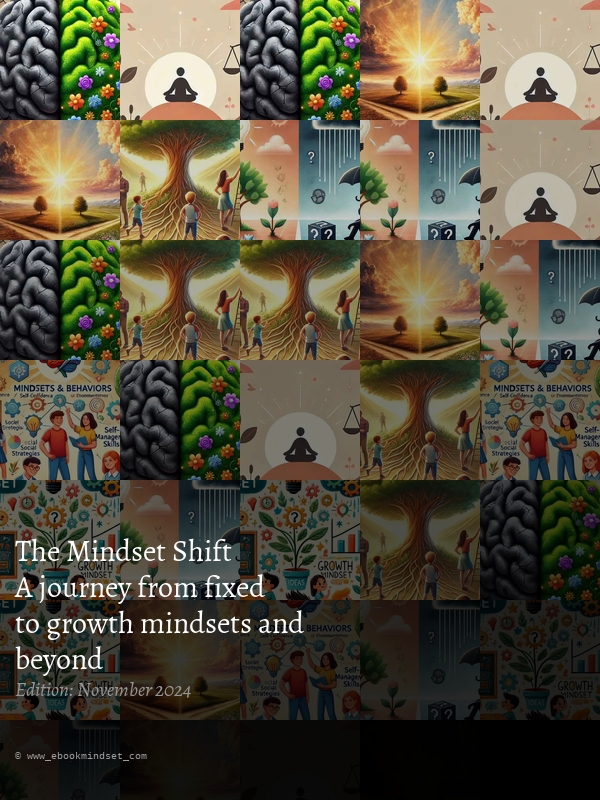Understanding the Present Mindset: A Comprehensive Guide
In today's fast-paced world, cultivating a present mindset has become more crucial than ever. This article delves into the concept of a present mindset, its significance, benefits, and practical strategies to develop and maintain it. By the end of this exploration, you will have a deeper understanding of how to harness the power of being present to enhance your overall well-being and effectiveness in daily life.
What is a Present Mindset?
A present mindset refers to the ability to focus on the current moment rather than being preoccupied with past regrets or future anxieties. It embodies a state of mindfulness where individuals are fully engaged in their experiences, thoughts, and feelings as they happen. This concept is rooted in psychological theories that emphasize the importance of awareness and engagement in enhancing mental health and overall life satisfaction. It's about shifting your focus from the relentless cycle of "what ifs" and "should haves" to a place of grounded acceptance and appreciation for the here and now. This doesn't mean ignoring challenges or responsibilities; rather, it's about approaching them with a clear, focused mind, free from the emotional baggage of the past or the anxieties of the future. A present mindset allows you to fully experience the richness and complexity of each moment, leading to a more fulfilling and meaningful life.
Key Characteristics of a Present Mindset
- Awareness: Being conscious of your thoughts, emotions, and surroundings. This involves paying attention to the subtle nuances of your internal and external experiences without judgment. Are you feeling tense? Are you aware of the sounds around you? Are you noticing the sensations in your body? This heightened awareness is the foundation of a present mindset.
- Engagement: Actively participating in the moment rather than passively observing. This means fully immersing yourself in whatever you are doing, whether it's a conversation, a task at work, or simply enjoying a cup of tea. It involves being fully present with your actions and thoughts, rather than being mentally distracted.
- Acceptance: Embracing experiences without judgment or resistance. This is crucial. Life presents a spectrum of experiences, both pleasant and unpleasant. A present mindset encourages acceptance of all experiences, without the need to constantly judge or analyze them. This doesn't mean condoning negative behaviors, but rather observing them without emotional reactivity.
- Focus: Concentrating on one task at a time without distractions. In our hyper-connected world, multitasking has become the norm. However, this often leads to decreased efficiency and increased stress. A present mindset prioritizes singular focus, allowing for deeper engagement and greater accomplishment.
The Importance of a Present Mindset
Enhancing Mental Health
Research indicates that maintaining a present mindset can significantly alleviate symptoms of anxiety and depression. By focusing on the here and now, individuals can reduce overthinking and ruminating on negative thoughts, which are often rooted in past experiences or future worries. The constant stream of worry about the future or regret over the past is a major contributor to mental health issues. A present mindset helps to break this cycle by anchoring you in the present moment, offering a sense of calm and stability.
Improving Relationships
Being present fosters deeper connections with others. When you engage fully in conversations and interactions, you demonstrate empathy and understanding, which strengthens relationships. This active listening, free from distractions and internal monologue, leads to more meaningful exchanges and helps build trust among friends, family, and colleagues. Being truly present allows you to connect with others on a deeper level, fostering stronger bonds and richer interactions.
Boosting Productivity
A present mindset enhances focus and concentration, allowing individuals to perform tasks more efficiently. By minimizing distractions and honing in on the task at hand, you can improve your productivity levels significantly. This is especially important in work environments where multitasking can lead to decreased performance. When you are fully present, you are less likely to make mistakes, and more likely to complete tasks with greater quality and speed.
Fostering Resilience
Cultivating a present mindset equips individuals with the tools to face challenges head-on. Rather than succumbing to feelings of helplessness when confronted with difficulties, those who practice mindfulness are more likely to respond constructively. This resilience is essential for personal growth and overcoming obstacles. By staying grounded in the present, you can better assess situations, make rational decisions, and find creative solutions to problems. The ability to handle challenges with grace and composure is a direct result of a well-cultivated present mindset.
Strategies for Developing a Present Mindset
- Mindfulness Meditation: Mindfulness meditation is one of the most effective ways to cultivate presence. It involves focusing on your breath and observing your thoughts without judgment. Start with just five minutes a day and gradually increase the duration as you become more comfortable with the practice. There are numerous guided meditations available online and through apps, making it accessible to everyone.
- Breathing Exercises: Utilize breathing techniques to anchor yourself in the present moment. Deep breathing can help calm your mind and redirect your focus away from distractions.
- Inhale deeply through your nose for a count of four.
- Hold your breath for a count of four.
- Exhale slowly through your mouth for a count of six.
- Repeat this cycle several times. This simple exercise can ground you in the present and help to reduce stress and anxiety.
- Engage Your Senses: To become more present, consciously engage your senses during everyday activities. Whether you're eating, walking, or washing dishes, pay attention to what you see, hear, smell, taste, and feel at that moment. This mindful engagement helps to bring you back into your body and out of your head, reducing the tendency to dwell on thoughts and worries.
- Limit Multitasking: Multitasking can fragment your attention and lead to feelings of overwhelm. Focus on completing one task at a time before moving on to the next. This approach not only enhances productivity but also allows for greater enjoyment of each activity. Choose one task, give it your full attention, and complete it before moving on to the next. This focus drastically increases efficiency and reduces stress.
- Practice Gratitude: Regularly reflecting on what you are grateful for can shift your focus from negative thoughts about the past or future to positive aspects of your current life. Consider keeping a gratitude journal where you write down three things you appreciate each day. This simple practice shifts your perspective towards positivity and appreciation for the present moment.
- Set Intentions: At the beginning of each day or before specific activities, set clear intentions about how you want to be present during those moments. This could involve committing to listening actively during conversations or being fully engaged during work tasks. By setting intentions, you consciously guide your focus and increase the likelihood of staying present.
- Digital Detox: In our technology-driven world, constant notifications can distract us from being present. Designate specific times during the day when you will disconnect from devices to immerse yourself fully in your surroundings. Regular digital detox periods are crucial for reclaiming your attention and cultivating a present mindset.
- Journaling: Journaling about your daily experiences can help reinforce mindfulness by encouraging reflection on moments that made you feel present or distracted. This practice allows you to identify patterns in your thinking that may hinder your ability to stay present. Regular journaling provides valuable insights into your thought patterns and allows you to identify areas for improvement.
Overcoming Challenges in Maintaining a Present Mindset
- Distractions: In an age filled with distractions—from smartphones to busy environments—staying present can be challenging. Combat this by creating designated spaces for focused work or relaxation free from interruptions. Minimize distractions as much as possible. Turn off notifications, create a quiet workspace, and communicate your need for focused time to others.
- Negative Thoughts: Negative thinking patterns can pull you away from the present moment. Recognize these thoughts as they arise and gently redirect your focus back to what is happening now. When negative thoughts arise, acknowledge them without judgment, and then gently guide your attention back to the present moment through your breath or your senses.
- Stressful Situations: High-stress environments may make it difficult to maintain mindfulness. Implement stress-reduction techniques such as deep breathing or brief breaks during stressful periods. Stress is a significant barrier to presence. Practice stress-reduction techniques regularly to equip yourself to handle stressful situations more effectively.
The Long-Term Benefits of Cultivating a Present Mindset
Improved Emotional Well-Being
Individuals who practice mindfulness report higher levels of emotional intelligence and self-regulation. This leads to better decision-making skills and enhanced interpersonal relationships. A present mindset promotes self-awareness, allowing you to better understand your emotions and manage them effectively.
Greater Life Satisfaction
By focusing on the present moment rather than dwelling on past mistakes or future uncertainties, individuals often find increased satisfaction in their daily lives. This shift in perspective fosters appreciation for life's simple pleasures. When you are present, you are more likely to notice and appreciate the small joys in life, leading to greater overall life satisfaction.
Enhanced Creativity
A present mindset encourages creative thinking by allowing individuals to explore ideas without being hindered by self-doubt or fear of failure. Engaging fully in creative processes often leads to innovative solutions. Being present allows your mind to wander freely, generating new ideas and fostering innovation.
Conclusion
In conclusion, embracing a present mindset is essential for navigating the complexities of modern life effectively. By cultivating awareness, engagement, acceptance, and focus in our daily experiences, we can enhance our mental health, improve relationships, boost productivity, and foster resilience against life's challenges. Implementing practical strategies such as mindfulness meditation, breathing exercises, sensory engagement, limiting multitasking, practicing gratitude, setting intentions, digital detoxes, and journaling can significantly contribute to developing this mindset. As we navigate our lives with greater presence and awareness, we unlock our potential for happiness and fulfillment—transforming not only our own experiences but also positively influencing those around us. Embrace the power of being present today; it's never too late to start living fully in the moment!




